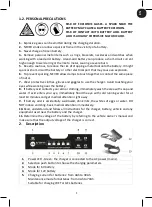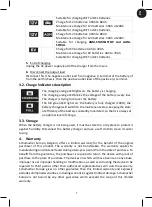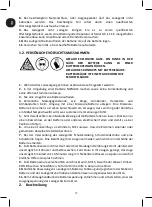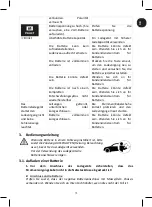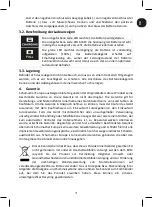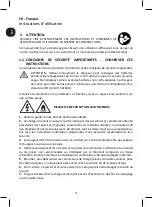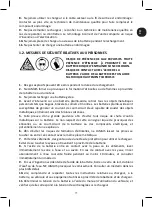
EN
2
3
1.2.
PERSONAL PRECAUTIONS
RISK OF EXPLOSIVE GASES. A SPARK NEAR THE
BATTERY MAY CAUSE A BATTERY EXPLOSION.
RISK OF CONTACT WITH BATTERY ACID. BATTERY
ACID IS A HIGHLY CORROSIVE SULFURIC ACID.
1.
Explosive gases can be emitted during the charging duration.
2.
NEVER smoke or allow a spark or flame in the vicinity of a battery.
3.
Never charge a frozen battery.
4.
Remove personal metal items such as rings, bracelets, necklaces and watches when
working with a lead-acid battery. A lead-acid battery can produce a short-circuit current
high enough to weld a ring or the like to metal, causing a severe burn.
5.
Be extra cautious, to reduce the risk of dropping a metal tool onto the battery. It might
spark or short-circuit the battery or other electrical part that may cause an explosion.
6.
To prevent sparking, NEVER allow clamps to touch together or contact the same piece
of metal.
7.
Wear protective clothes, gloves and goggles to use the charger. Avoid touching your
eyes while working near the battery.
8.
If battery acid contacts your skin or clothing, immediately wash the area with soap and
water. If acid enters your eye, immediately flood the eye with cold running water for at
least 10 minutes and get medical attention right away.
9.
If battery acid is accidentally swallowed, drink milk, the whites of eggs or water. DO
NOT induce vomiting. Seek medical attention immediately.
10.
Read, understand and follow all instructions for the charger, battery, vehicle and any
equipment used near the battery and the charger.
11.
Determine the voltage of the battery by referring to the vehicle owner’s manual and
make sure that the output voltage of the charger is correct.
2.
Description
1.
Power LED - Green: the charger is connected to the AC power (mains).
2.
Selection push button to choose the charging parameters.
3.
Mode for 6V battery
4.
Mode for 12V battery
5.
Charging current for batteries: from 4Ah to 30Ah.
Maintenance mode for batteries: from 4Ah to 70Ah.
Suitable for charging WET or GEL batteries.



